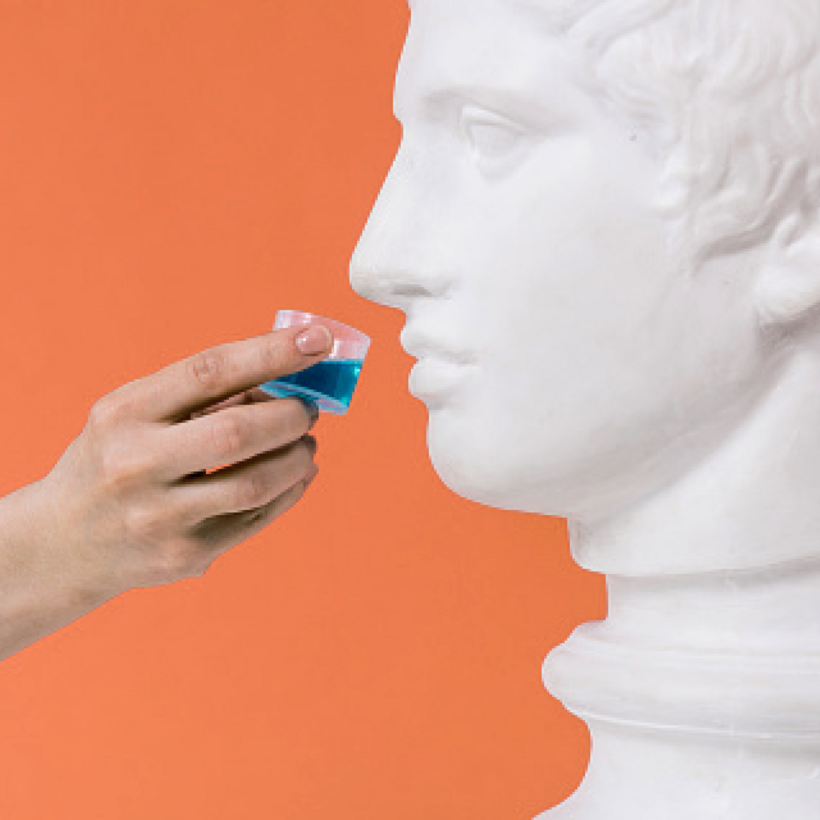One of the comforting sounds of my childhood was my dad gargling in his bathroom before heading off to work. My sister and I would join in, heads thrown back, warbling our froggy music.
The mouthwash in question, Listerine Antiseptic—a potent, alcohol-rich brew—was doing all sorts of damage to something that, until fairly recently, wasn’t a concern: the good bacteria in our oral microbiome. The aim for ages was to kill bacteria, not encourage them to thrive.
If you suspected that a liquid that burns like fire and looks like Windex might not be what you want in your mouth, you would be correct. Dr. Raúl Bescós, an associate professor of human nutrition and physiology at the University of Plymouth, in England, has published numerous studies on the effects of mouthwash on the oral microbiome. His conclusion? “They aren’t so beneficial.”
How not beneficial? After gargling daily for as little as one to two weeks with certain mouthwashes, researchers noticed an increase in blood pressure and, in turn, heart disease. This happens because the oral microbiome, which converts dietary nitrates into nitrites, are essential to the production of nitrous oxide, which is essential to maintaining normal blood pressure. “Anything increasing blood pressure should be a concern,” says Bescós, a master of understatement.
“We know one cannot be well without an adequate amount of NO [nitrous oxide] circulating throughout the body. Yet, the very first thing over 200 million Americans do each day is use an antiseptic mouthwash, which destroys the ‘good bacteria,’” wrote Dr. Nathan S. Bryan, as an adjunct professor in the department of molecular and human genetics at the Baylor College of Medicine in Houston, in another study. “These once thought good habits may be doing more harm than good.”
A healthy, thriving oral bacteria, some research suggests, may play a crucial role in preventing other diseases, including prediabetes and diabetes. They’re also quite lovely for your teeth. When the pH of saliva decreases, it can make tooth enamel more vulnerable to cavities and demineralization. And that can result in tooth loss.
As terrible as all that sounds, there’s more. When these chemicals destroy the composition of the oral microbiome, they also harm the gut microbiome, says Bescós. “We transfer a lot of microbes from the mouth to the gut through saliva.”
A chemical called chlorhexidine, or CHX, is particularly problematic. It’s used in prescription-only mouthwashes, so most people are unlikely to stumble upon it in the aisles of CVS. Any rinse labeled “anti-microbial” is trouble, too, because it blasts the good bacteria along with the bad. There’s also alcohol in a number of formulas, and that, too, turns the pH of saliva from neutral to acidic, killing the good and bad bacteria indiscriminately, according to Bryan’s study.
The people who created Listerine masterminded this whole mess in the early 20th century by coming up with a term for bad breath that made it sound like a medical condition and marketing it with fear campaigns. “Halitosis makes you unpopular,” read one ad. “Your closest friends won’t tell you.” And: “They talk about you behind your back.” Paranoia and fear of social ostracism were highly effective threats. So was the line “Often a bridesmaid but never a bride.”
A spokesperson from Listerine responded to my question about its effect on the microbiome with the statement, “Listerine supports a healthy microbiome by reducing bacteria that cause plaque and gingivitis and supports an environment for commensal bacteria to thrive. ”
So what’s a relatively paranoid bridesmaid supposed to do? Bescós recommends natural mouthwashes, including those made with propolis, a mixture of beeswax and resin from honey. It contains polyphenols and some vitamins. He also likes gargling with cooled peppermint tea. “That can have a positive effect and can be helpful to gum disease.”
You could always take a page from Gwyneth’s playbook and engage in oil pulling, an Ayurvedic practice that involves swishing a teaspoon of oil—coconut is especially popular—for 10 minutes or more. Studies have shown that it freshens breath and reduces plaque and gingivitis. But it doesn’t replace brushing or flossing, nor does it whiten teeth.
While you’re at it, you might want to eat more vegetables, including lettuce, spinach, and arugula, which produce more good bacteria in the mouth. “That can protect against periodontal disease and can help reduce blood pressure,” Bescós says. But don’t turn to breath-freshening gum unless you crave microplastics; a new study shows that a single stick can release up to 3,000 microplastics into saliva.
Meanwhile, keep brushing and flossing—and trust that your friends are probably talking behind your back. Mouthwash is powerless against that, too.
Linda Wells is the Editor at Air Mail Look




